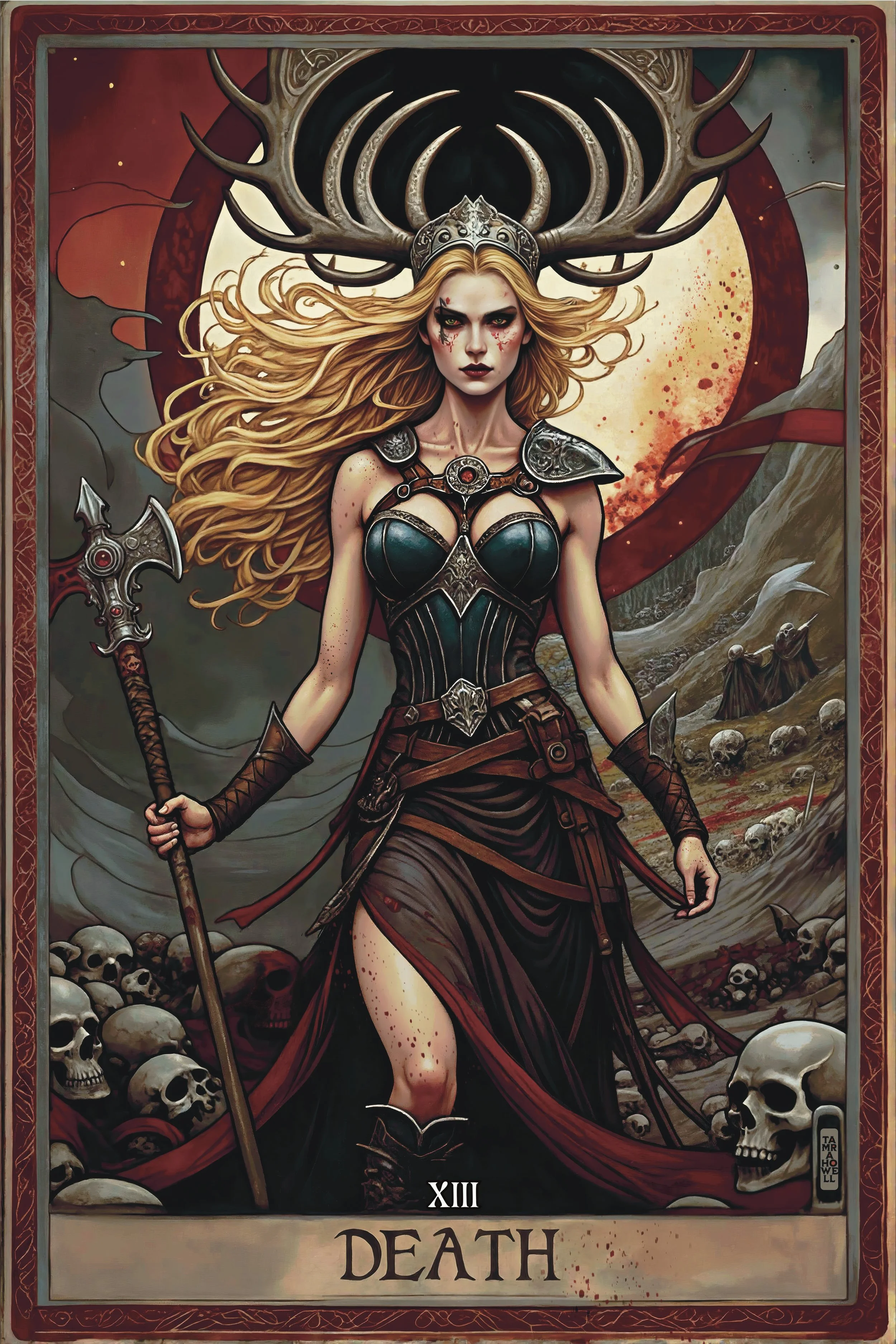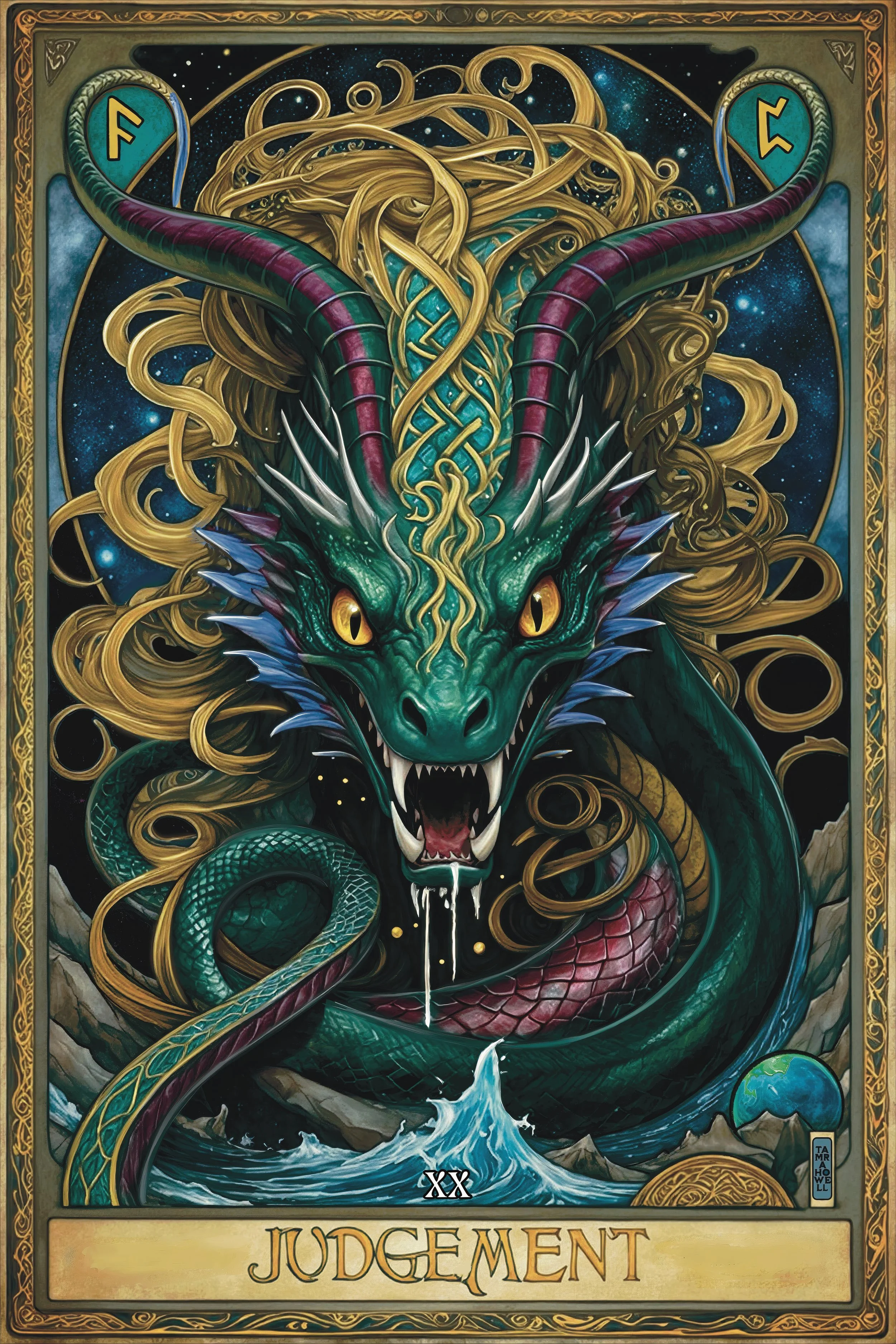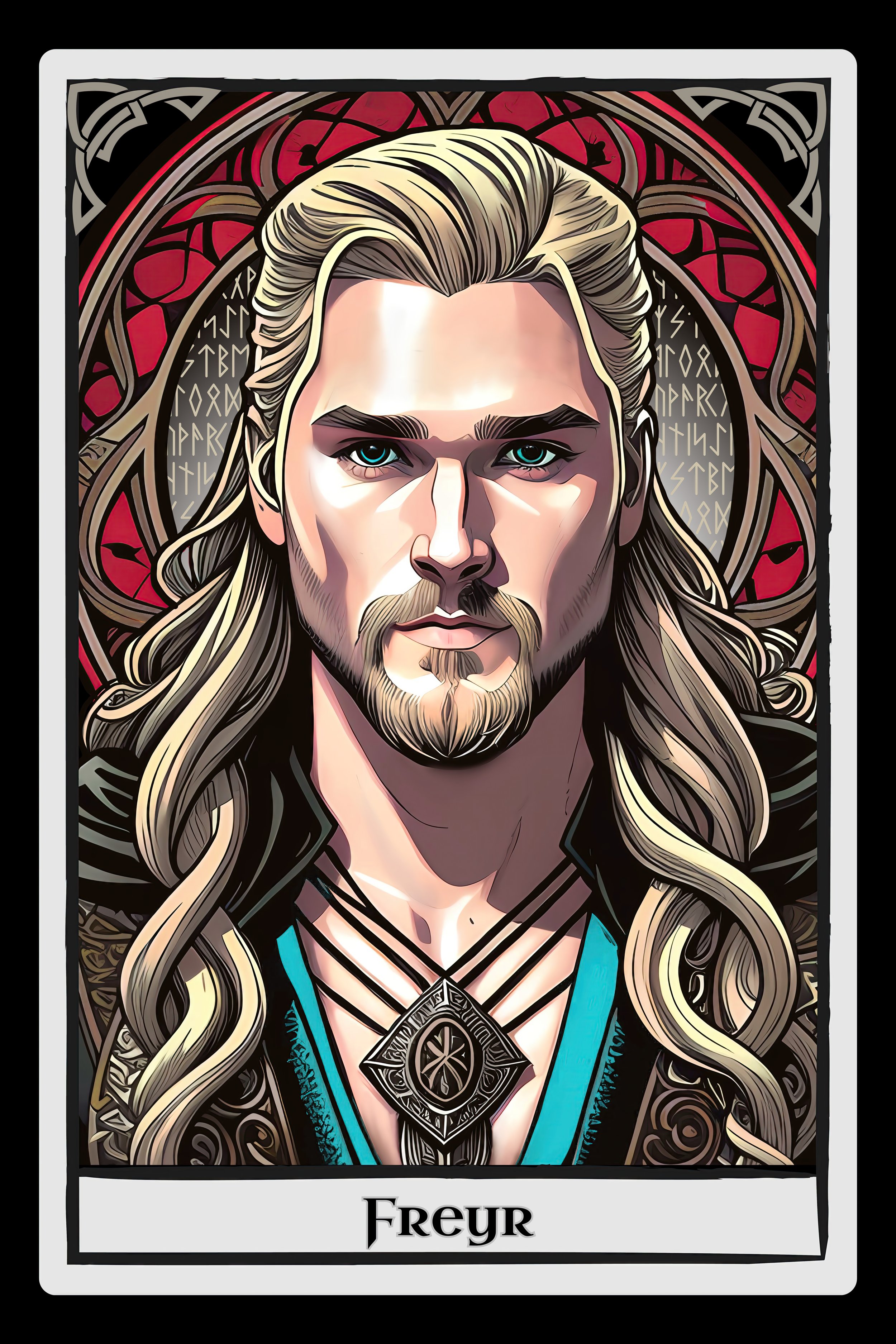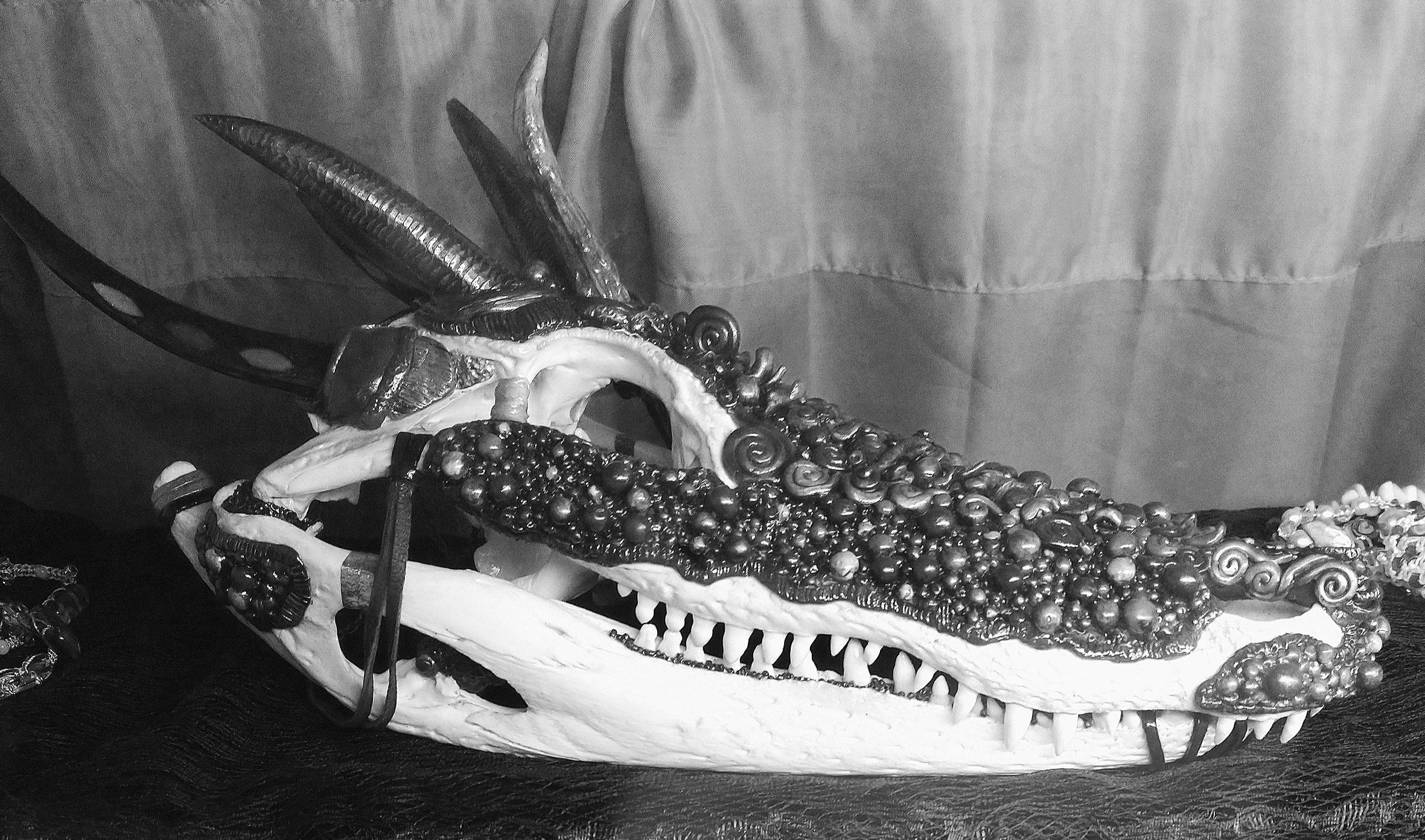Studio Blog: Insights into Art, Process, and Inspiration
Welcome to the studio blog, where I share behind-the-scenes glimpses into my creative process, updates on ongoing projects, and musings on the stories and symbolism that shape my work. Whether you’re interested in the evolution of my Norse tarot deck, the inspiration behind my mixed media sculptures, or the deeper meanings embedded in my art, this space is dedicated to offering insight into the thought and care behind each piece.
Join me as I explore the intersection of mythology, history, and creativity, and stay updated on new releases, upcoming exhibitions, and special projects.

Sigyn: The Unsung Goddess of Devotion and Resilience
Sigyn is one of the lesser-known yet profoundly significant figures in Norse mythology. Often overshadowed by her infamous husband, Loki, Sigyn embodies the virtues of loyalty, devotion, and resilience. While she is not a warrior goddess or a powerful sorceress, her story is one of quiet strength, sacrifice, and unwavering dedication.

Skögul: DEATH and Transformation
Skögul as DEATH
In the iconic Death tarot card illustration, Skögul strides confidently through a battlefield, axe in hand, surrounded by the remnants of fallen warriors. The stag-horned helm atop her head symbolizes her connection to the wild and untamed aspects of nature, while her axe represents the swift and inevitable passage of time.

Jörmungandr as JUDGEMENT
Jörmungandr as JUDGEMENT, THowell 2025
Jormungandr for the Judgment tarot card conveys a powerful message of renewal, awakening, and divine judgment, inviting the querent to embrace change and embark on a journey of spiritual transformation.

Freyr as THE KING OF SWORDS
Freyr as THE KING OF SWORDS. In the realm of the Norse Tarot, Freyr stands as the embodiment of intellectual authority, leadership, and governance in the Minor Arcana card of the King of Swords. His depiction amidst a sunny field of hops near a homestead paints a vivid picture of his regal presence and strategic prowess. Let's explore the symbolism imbued in this illustration and its correlation to the traditional attributes of the King of Swords card.

Freyja as THE EMPRESS
Freyja as THE EMPRESS. Briefly, In the realm of Norse mythology, Freyja stands as a powerful symbol of the divine feminine, embodying the nurturing and fertile aspects of the Empress archetype. As a goddess of love, fertility, and abundance, Freyja's presence evokes creativity, sensuality, and the transformative power of growth and nurturing. Let us delve into the depths of Freyja's depiction as the Empress in a Viking-inspired tarot deck, exploring the rich symbolism imbued in her imagery and how it resonates with the traditional interpretation of the Empress card.

Skuld and Skogul: Valkyries of Destiny and Battle
In the rich tapestry of Norse mythology, amidst the clash of swords and the roar of battle, stand two formidable figures: Skuld and Skogul, valkyries of destiny and war. As we delve into the depths of Norse lore, we uncover the mysterious and awe-inspiring tales of these fierce maidens who serve Odin, the Allfather, and weave the fabric of fate on the battlefield.

Skadi: Lady of Thrymheimr, Queen of Ice and Snow
In the frost-kissed realms of Norse mythology, one figure stands tall amid the towering peaks and icy winds: Skadi, the Jotun lady of Thrymheim and the queen of ice and snow. Adorned in shades of icy blue and white, Skadi embodies the rugged beauty and untamed wilderness of the northern lands.

Njord: Serene Sea God
As the father of Freyja and Freyr, and the initial husband of Skadi, Njord's familial ties weave a complex web of relationships within the Norse pantheon.

Freyr: Benevolent God of Fertility, War, and Abundance
Freyr's essence radiates with the verdant hues of green and gold, symbolizing his dominion over fertility and prosperity. As the son of Njord, the sea god, Freyr embodies the cyclical rhythms of life and the vitality of the changing seasons. In the Eddic poem "Gylfaginning," Snorri Sturluson describes Freyr's divine attributes: "Freyr is the most renowned of the Æsir; he rules over the rain and the shining of the sun, and therewithal the fruitfulness of the earth." These words evoke the benevolent nature and boundless generosity that Freyr bestows upon the land and its inhabitants.

Freyja: Unveiling the Radiant Goddess of Love, War, and Destiny
Freyja's essence is as enchanting as the hues of gold and turquoise that adorn her being. As the daughter of Njord, the sea god, and sister to Freyr, the god of fertility, she embodies the cyclical rhythms of life and nature. Her golden locks and turquoise adornments symbolize her celestial origins, evoking themes of prosperity, abundance, and transcendence. In the words of the Eddic poem "Grimnismal," Freyja's radiant presence illuminates the cosmos: "Her tears are red gold, her beauty gold, and her tears pearls." Through this evocative imagery, we gain insight into the ethereal beauty and divine grace that characterize Freyja's essence.

Nidhoggr, Agent of Chaos
In the Norse mythological tradition, Nidhogg is described as dwelling within Niflheim, the realm of mist and darkness, where it gnaws incessantly at the roots of Yggdrasil. These roots serve as the foundation of the cosmos, linking the nine realms together and sustaining the order of the universe. Nidhogg's ceaseless chewing symbolizes the gradual erosion of this order, foreshadowing the impending chaos of Ragnarok.

Cherokee Storytelling Masks Revisited
Origin of the Milky Way is a Cherokee Storytelling mask based on the Cherokee folktale explaining how the Milky Way came to be.


Resurrecting Nidhoggr
Random thoughts on the inspiration and processes involved in creating the mixed media sculpture Nidhoggr:Ragnarok.

